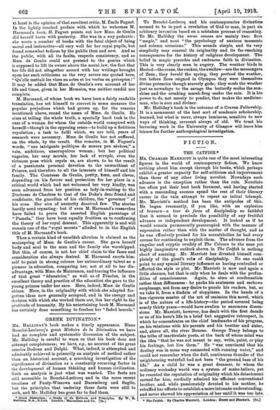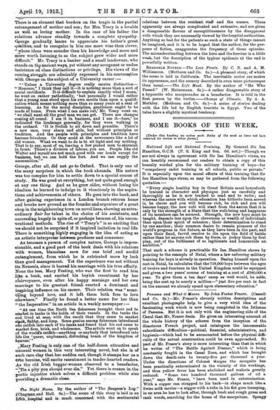FICTION.
1111. CATFISH.* MR. CHARLES MARRIOTT is quite one of the most interesting figures in the world of contemporary fiction. We know nothing about him except through his books, which perhaps. exhibit a greater capacity for self-criticism and improvement than those of any other living novelist. Nowadays such advance is the exception rather than the rule. Novelists too often put their best book foremost, and having started with a resounding success spend the rest of their literary career in the vain attempt to repeat an initial triumph. Mr. Marriott's method has been the antipodes Of this. He began resonantly, if you like, with an explosion of bravura—a tour de force of discipleship so faithful that it seemed to preclude the possibility of any fruitful advance or independent development. It looked as if he would remain permanently preoccupied with the manner of expression rather than with the matter of thought, and as he was effusively praised for his eccentricities he had every excuse for continuing to exploit them. The advance from the angular and cryptic crudity of The Column, to the sane yet highly imaginative outlook shown in The Catfish is nothing short of amazing. Mr. Marriott has divested himself com- pletely of the giant's robe of discipleship. No one could point to any special literary influence as having controlled or affected the style or plot. Mr. Marriott is now and again a little obscure, but that is only when he deals with the profun- dities of consciousness. Again, he aims at condensation rather than diffuseness : he packs his sentenees and eschews surplusage, not from any desire to puzzle his readers, but, so we take it, from a disdain of sloppiness. In the hands of a less rigorous master of the art of omission this novel, which is of the nature of a life-history—the period covered being nearly thirty years—would have swollen to enormous dimen- sions. Mr. Marriott, however, has dealt with the first decade or so of his hero's life in a brief but suggestive retrospect, in which he concentrates on the chief landmarks of his progress, on his relations with his parents and his brother and sister, and, above all, the river Bourne. George Tracy belongs to the tribe of inarticulate poets, at the back of whose mind was the idea "that he was not meant to say, write, paint, or play his feelings, but live them." He "was convinced that his destiny was in some way connected with running water," and could not remember when the dull, continuous thunder of the neighbouring waterfall had not been "the ground bass of his life." As a child he was a great dreamer, to whom the ordinary workaday world was a system of make-believe, yet he resented the reputation of originality which his detachment earned for him, cordially admired his efficient conventional brother, and, while passionately devoted to his mother, he rebuffed her efforts to establish a more intimate understanding, and never showed his appreciation of her until it was too late.
• The Catfish, By Charles Marriott. London: Buret and Blackett. Ds.]
There is an element that borders on the tragic in the partial estrangement of mother and son ; for Mrs. Tracy is a lovable as well. as loving mother. In the case of his father the relations advance steadily towards a complete sympathy. Coorge gradually, learns to appreciate his father's great qua,' lities, and to recognize in him one more wise than clever, "whose ideas were sounder than his knowledge and more and more worth listening,to as the_ subject grew wider and more
-difficult." Mr. Tracy is a banker and a small landowner, who stands on the ancient ways, yet without any arrogance or undue insistence on class distinctions or privilege. His views of the coming,struggle are -admirably expressed in his conversation -with George on the subject of a University career :—
"'Unless a University degree really carries distinction- " Honours," I think they call it—it is nothing more than a sort of
social certificate. It-is diffieult to explain exactly what I mean,' he went on rather pathetically, 'but personally I would rather -that a young man stood upon his own merits than upon a qualifi- cation, which means nothing more than so many years at a seat of learning. As for the moral discipline, gentlemen ought to be made at home. From what. I can make out,' Mr. Tracy went on, 4 we shall want all.the good men we can get. There are changes coming all round: I see it in business, and I see it—here,' he indicated the landscape generally, for they were walking in -the orchard. 'It is foolish to sit down and grumble. There's a new race, very sharp and able, but without principles or tradition. And the people with principles and tradition have become frivolous. Or .they scold at the newcomers like a lot of old women. What we. want to do is to sit tight and say nothing. That is to say, most of us, leaving a few picked men to skirmish in fronts There's a division of labour, you see. People like old Walter and myself are-not much good with our heads except for basiness, bat. we can hold the fort. And we can supply the ammunition.' " George, after all, did not go to Oxford. That is only one of the many surprises in which the book abounds. His nature was too complex for him to settle down to a special course of study.. He was good at everything, but not quite good enough at any one thing. And as he grew older, without losing his idealism he learned to indulge in it vicariously in the aspira- tions and' achievements of others. He goes into the bank, and after, gaining experience in a London branch returns home and breaks new ground as the founder and organizer of a great shop in the neighbouring town on novel lines, showing an extra- ordinary flair for talent in the choice of his assistants, and succeeding hugely in spite of, or perhaps because of, his uncon- ssentional methods. The rise of "Tracy's" is so exciting that we- should not be surprised_ if it inspired imitation in real life. There is something highly engaging in the idea of acting as an artistic interpreter between producer and consumer.
As becomes a person of complex nature, George is impres- sionable, and a good part of the book deals with his relations with women, blameleaa save for one brief _and sordid entanglement, from which he is extricated more by luck than good management. Yet the experience was not without
its Nemesis, since it barred his marriage with his true affinity. None the less, Mary Festing, who was the first 'to read him like a book, and excited his boyish resentment by her -clairvoyance, even after_ hia happy marriage and her own
marriage to his greatest friend- exerted a dominant and inspiring influence, on, his career. Their relation was "some- -tiling beyond love, and it left them both free to love .elsewhere." Finally he found a better name for her than " the Imperative" juan article in a weekly newspaper :—
"it one time the North Sea fishermen brought their cod to Market in tanks in the holds_ of their vessels. In the tanks the cod lived at ease, with the, result that they came to market elock, flabby, and limp. some genius among fishermen introduced offs, catfish into each of his tanks and found that his cod came to market firm, brisk, and wholesome. The article went on to speak of the world's datfish—anything or anybody that introduced into life the 'queer, unpleasant, disturbing. touch of the kingdom of heaven."
„Mary Fading is only. one .of the half-dozen attractive and unusual women.in this very interesting novel, but she is of
-such rare clay thather sudden end, though it stamps her as a tele heroine, will excite resentment in tender-hearted readers. As the old Irish beggar-woman observed to a benefactor,
-""Tis a pity you should ever die." Yet there is reason in the poetic injustice which solves a difficult problem while also
providing a dramatic close.











































 Previous page
Previous page